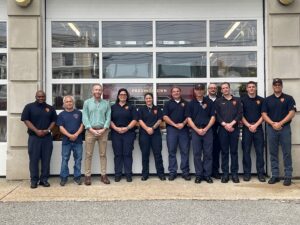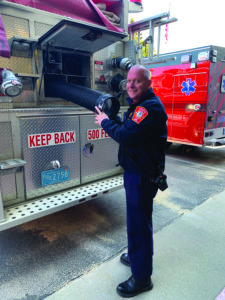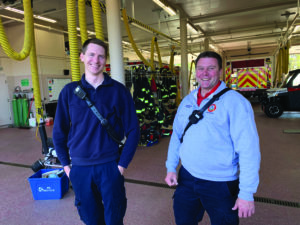PROVINCETOWN — Lower Cape Ambulance Association (LCAA) Chief Operating Officer Steven Roderick announced this week that the nonprofit service will shut down on Sept. 1. The reason, he said, was an insurmountable loss of staff.
Truro and Provincetown have been adding emergency medical personnel as they prepare to transition from the longtime collaborative arrangements they have had with LCAA.
In January, it seemed LCAA might cease operations by July 1, forcing the towns to build their in-house fire and rescue capacities rapidly. But following successful negotiations in March and April, the parties agreed to complete the transition gradually over the next three years.
At the end of June, Provincetown brought on eight new full-time firefighter-medics, six of whom were former LCAA employees. According to Roderick, this represented an unanticipated blow to the nonprofit’s operations. It has proved impossible to rebuild swiftly enough, he said, despite efforts to recruit additional per-diem medics.
“LCAA was led to believe that Provincetown might hire two of our current employees in its first round of recruiting,” he wrote in an Aug. 7 press release. “This sudden shift in the hiring plan for Provincetown significantly impacted LCAA’s ability to fully staff all shifts going forward.”
Provincetown Town Manager Alex Morse said LCAA should not have been blindsided by the town’s hiring move. “Before extending job offers to any LCAA employees, we spoke with LCAA management about specific names and the number of staff to ensure it would not impact their operations,” Morse wrote in an email to the Independent.
The LCAA board met last Thursday, Roderick said, and voted unanimously to dissolve the organization. Provincetown and Truro town officials were notified on Friday afternoon.
“We’ve had shortages since July 1st,” Roderick said in an interview. “We don’t want to exist if we can’t deliver a service. You can’t be hanging on when it’s about patient care.”
Morse wrote that he was “disappointed” by LCAA’s imminent disbandment. “We were hopeful that we would continue our partnership with them for at least a few more years, and were a bit taken aback by the news since the possibility of LCAA ceasing operations so soon was never communicated to us,” he wrote.
Morse said he is confident that Provincetown will be able to make the additional new hires required to compensate for LCAA’s closure.
Provincetown received 54 applications — including 12 from LCAA employees — for the eight new full-time positions that town meeting voters approved in April, according to Assistant Town Manager Dan Riviello.
Morse said that the town will now use the fiscal 2024 funding appropriated for the LCAA contract, which was supposed to be renegotiated in the coming weeks, to hire additional fire and EMS personnel. “There were several other qualified candidates who applied and were interviewed in our last round of hiring, and we’re confident we can move expeditiously to bring more staff on board,” he wrote.
“At this time, we do not anticipate needing an additional ask of town meeting voters at this fall’s special town meeting,” Morse added.
The ambulance line item in this year’s budget came to $1,120,000 after a debt override boost of $101,876.
Provincetown may have been surprised by the news from LCAA, but Truro was anticipating it, said Truro Town Manager Darrin Tangeman in an interview on Monday.
The town meeting warrant appropriated $706,000 from free cash to the fire and rescue budget for “one-time and short-term EMS provision” during the transition from LCAA. The town has already contracted with Montana-based Best Practice Medicine to hire two traveling paramedics on six-month terms and is seeking additional paramedics from the company.
Tangeman also said the town was making offers to three additional candidates on Monday to fill remaining firefighter-medic roles after hiring three new employees since March. As the Independent reported last week, 11 candidates were interviewed this month, just one of whom was from LCAA.
A press release distributed by Tangeman’s office on Tuesday described increasing mutual aid requests from Provincetown as a strain on the region’s EMS capacity. “Truro officials strongly encourage Provincetown to engage supplemental service provisions, such as Traveling Paramedics or another ambulance service, to alleviate the burden on the Outer Cape’s advanced life support system while Provincetown strives to meet full staffing,” the press release read.
But according to Morse, “Provincetown has been able to provide the needed coverage throughout the entire summer when Lower Cape was unable to provide the agreed upon staffing for their shifts.” The town is “exploring options with other ambulance providers” for supplemental coverage through Halloween, although that’s “unlikely to be necessary,” Morse wrote.
Tangeman told the Independent on Aug. 8 that he and Morse are in communication about how best to cope with the LCAA decision.
Roderick said his organization will work with its remaining employees to help them get jobs before Sept. 1. Several of them already have full-time jobs elsewhere, he noted.
“Clearly, Provincetown will need more people, so maybe some will jump to Provincetown,” said Roderick. “Truro is looking. Other departments are looking. Coastal Medical is looking. These people are in demand.”
Like so many social-service and health-care fields, emergency services nationwide are facing worsening workforce shortages, according to a 2022 survey from the American Ambulance Association. Numerous news reports indicate that Cape Cod is no exception.
The Lower Cape Ambulance Association has been the Cape tip towns’ regional ambulance service for 86 years. The idea behind the model was to keep fire department costs down and reduce strain on volunteer EMS personnel. But Lower Cape’s dissolution has been brewing since at least 2022, when Truro commissioned a report from Capital Strategic Solutions that pointed out that the service was not meeting its full contractual obligation to provide three ambulances and six medics for Truro and Provincetown.
Increased communication between LCAA and the towns this spring seemed to have restored the three-way relationship.
“It’s a very sad day for me,” Roderick said.







